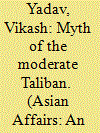| Srl | Item |
| 1 |
ID:
142261


|
|
|
|
|
| Summary/Abstract |
The International Development Association (IDA), the World Bank's facility for low-income countries, has granted India an unprecedented exception to its usual “graduation” policy—extending transitional support to its largest borrower, even though it has crossed the normal eligibility cutoff for IDA’s soft loans (based on per capita income). Before 2012, some Indian officials had called for a “graceful graduation,” believing that India did not need concessionary development assistance any longer. But with IDA graduation imminent in 2013 and facing a limit on borrowing from the Bank’s other window for middle-income countries, the International Bank for Reconstruction and Development, India successfully appealed for continued IDA access. This article draws on official interviews and documents to show how India secured post-graduation transitional support from IDA—suggesting that while India’s leaders seek to present their country as a rising power with influence in multilateral institutions, they can also be pragmatic in their status demands and quietly persuasive in their economic diplomacy.
|
|
|
|
|
|
|
|
|
|
|
|
|
|
|
|
| 2 |
ID:
101234


|
|
|
|
|
| Publication |
2010.
|
| Summary/Abstract |
The idea that there is a moderate faction of the Taliban (from a Western liberal perspective) or that the policies of the Taliban can be moderated to support a constitutional democracy has been a persistent myth across three U.S. presidential administrations. In this article, the author examines the actual governing structure, ideology, and social networks of the Taliban explains why a discrete and ideologically identifiable moderate faction with moderate policy objectives has failed to materialize. The author concludes that the consistent dissemination of this myth despite any substantial evidence reflects the imperative to expedite an exit policy as well as the United States' limited long-term interests in Afghanistan, Pakistan, and the South Asia region.
|
|
|
|
|
|
|
|
|
|
|
|
|
|
|
|
| 3 |
ID:
105190


|
|
|